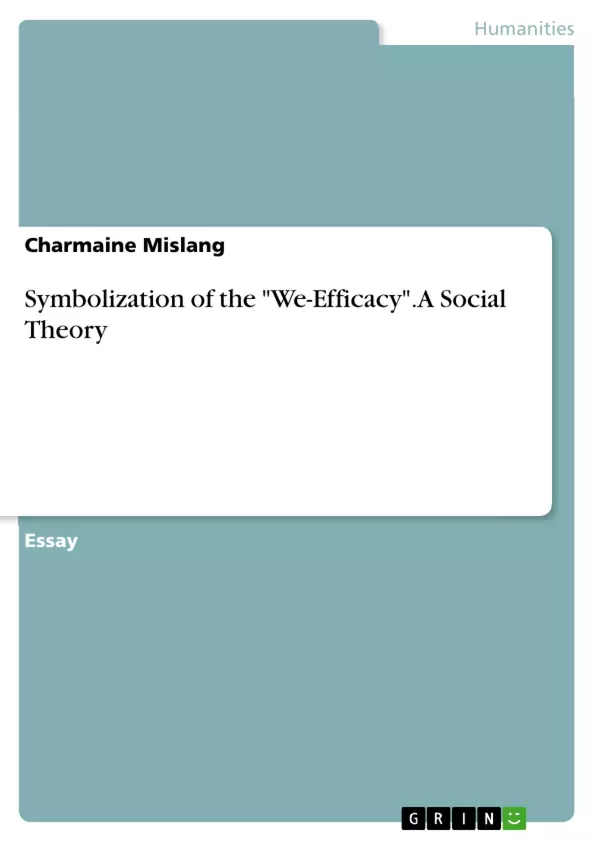Over and over again we have been taught the importance of confronting our problems and moving on like it's nobody's business. Often we do it alone, and when we fail, we sometimes hit rock bottom and feel like there is no way out. But what if I told you there was? And what if I told you that it started with the self—that the critical part of rising up only required reaching out?
Gordon (2004) and Collins (2000) directly emphasize that to make unquestionable progress, one must recognize the need to share the pain with other individuals who may be in a similar situation or simply wants to lend a hand. Including the self with others is a realization that the self is only the surface of the flesh—that there is more to an individual’s mere physical and mental being. Collins strongly advocates this by asserting that the "self is found in the context of family and community" (113). Your relationships with others build on your individuality as you share values, beliefs, and desires together. This larger self allows utopian thinking into perspective when utilizing the components (larger self) that build it.
Inhaltsverzeichnis (Table of Contents)
- Symbolization of the "We-Efficacy"
- The We-Efficacy
- Utopian Thinking and the Good Society
- The Struggles of the Working Class
- Double Consciousness and the Self
- Alienated Labor and the Self
- The Bangladesh Workers in Dhaka
- Re-evaluating the Trade System
- The We-Efficacy in Action
Zielsetzung und Themenschwerpunkte (Objectives and Key Themes)
This paper explores the concept of "we-efficacy," which emphasizes the importance of collective action and shared experiences in confronting challenges and creating positive social change. It argues that by recognizing our interconnectedness and working together, we can overcome obstacles and build a better society.
- The significance of collective action and shared experiences in social change
- The concept of "we-efficacy" as a force for positive transformation
- The role of utopian thinking in envisioning and achieving a better future
- The challenges of alienation and exploitation in modern society
- The potential for social change through collective action and community building
Zusammenfassung der Kapitel (Chapter Summaries)
- The paper begins by introducing the concept of "we-efficacy" and its connection to utopian thinking, arguing that collective action is essential for overcoming challenges and achieving positive social change.
- The author then examines the struggles of the working class, drawing on the work of Marx and Engels, and explores how the concept of "we-efficacy" can be applied to address these issues.
- The paper further explores the concept of double consciousness and how it can be reinterpreted as a source of strength and resilience, rather than a barrier to self-realization.
- The author then delves into the issue of alienated labor and how it can lead to feelings of isolation and disconnection from the self. The paper argues that recognizing and addressing shared struggles can help to alleviate this alienation.
- The paper concludes with a case study of the Bangladesh garment workers, highlighting the power of collective action and community building in challenging exploitative working conditions and advocating for fairer treatment.
Schlüsselwörter (Keywords)
The main keywords and focus topics of this paper include: we-efficacy, utopian thinking, collective action, social change, alienation, exploitation, working class, double consciousness, community building, and social justice.
Frequently Asked Questions
What is the concept of "we-efficacy"?
"We-efficacy" is a social theory that emphasizes collective action and shared experiences. It suggests that individuals can overcome challenges better by working together rather than facing them alone.
How does utopian thinking relate to social change?
Utopian thinking allows individuals to envision a "good society." By sharing values and beliefs within a community, this vision becomes a catalyst for positive social transformation.
What role does community play in forming the "self"?
As argued by scholars like Collins, the self is found in the context of family and community. Our relationships and shared desires build our individuality beyond our physical being.
What is the impact of alienated labor on the individual?
Alienated labor, a concept from Marx, leads to isolation and disconnection. "We-efficacy" proposes that addressing these shared struggles collectively can help alleviate this alienation.
How can "we-efficacy" be seen in action?
The paper uses the case study of Bangladesh garment workers in Dhaka, showing how they utilized collective action to advocate for fair treatment and better working conditions.
- Quote paper
- Charmaine Mislang (Author), 2015, Symbolization of the "We-Efficacy". A Social Theory, Munich, GRIN Verlag, https://www.hausarbeiten.de/document/323098


